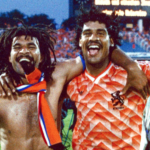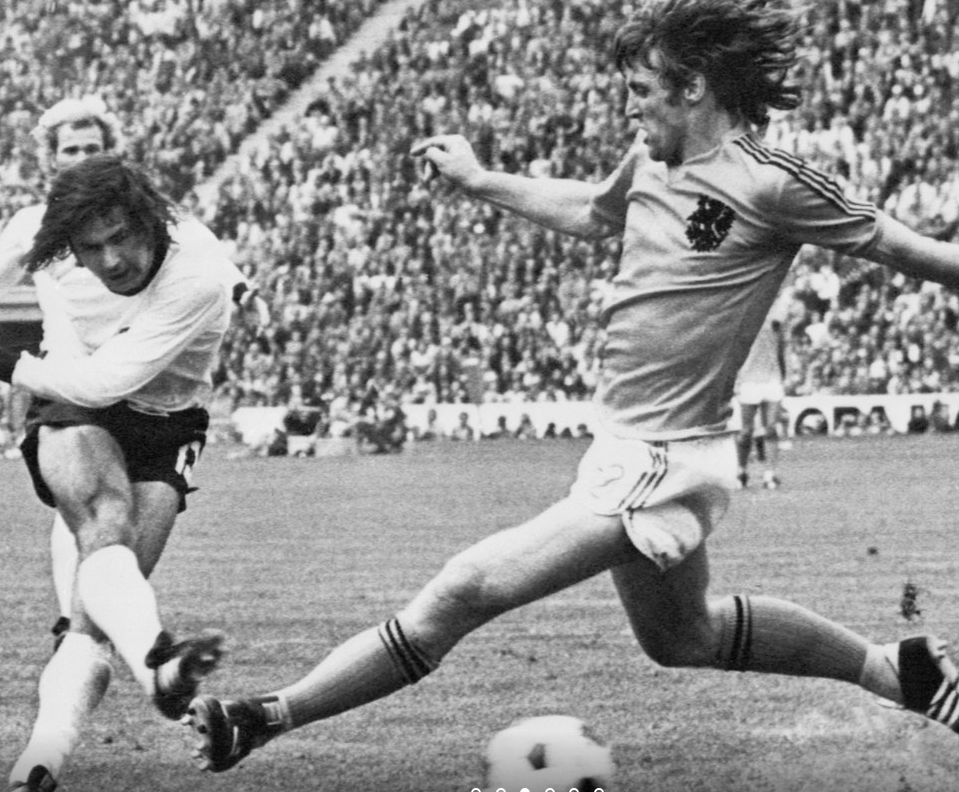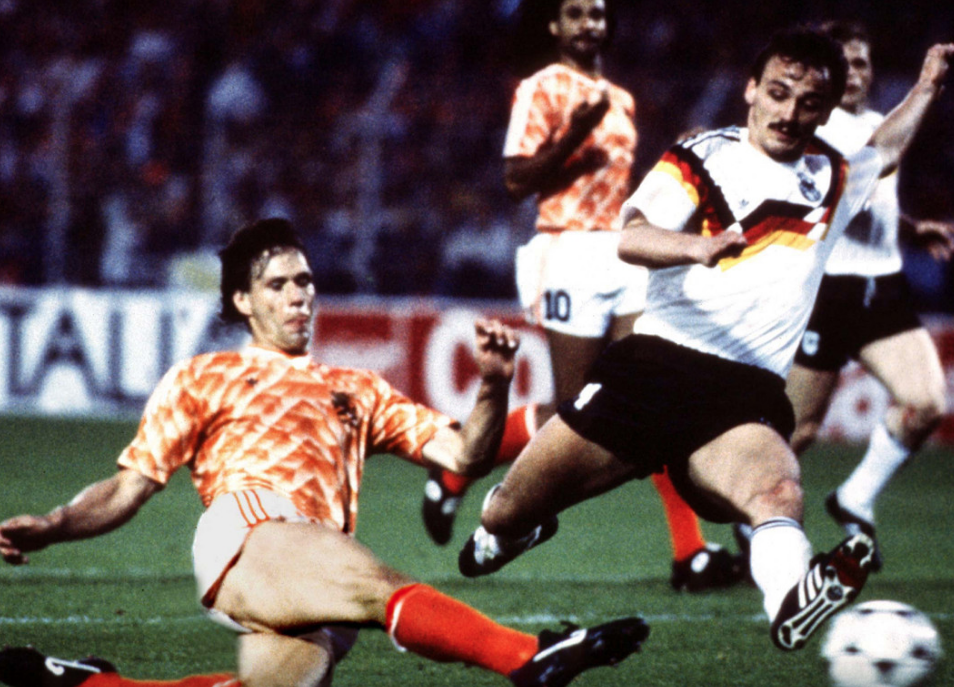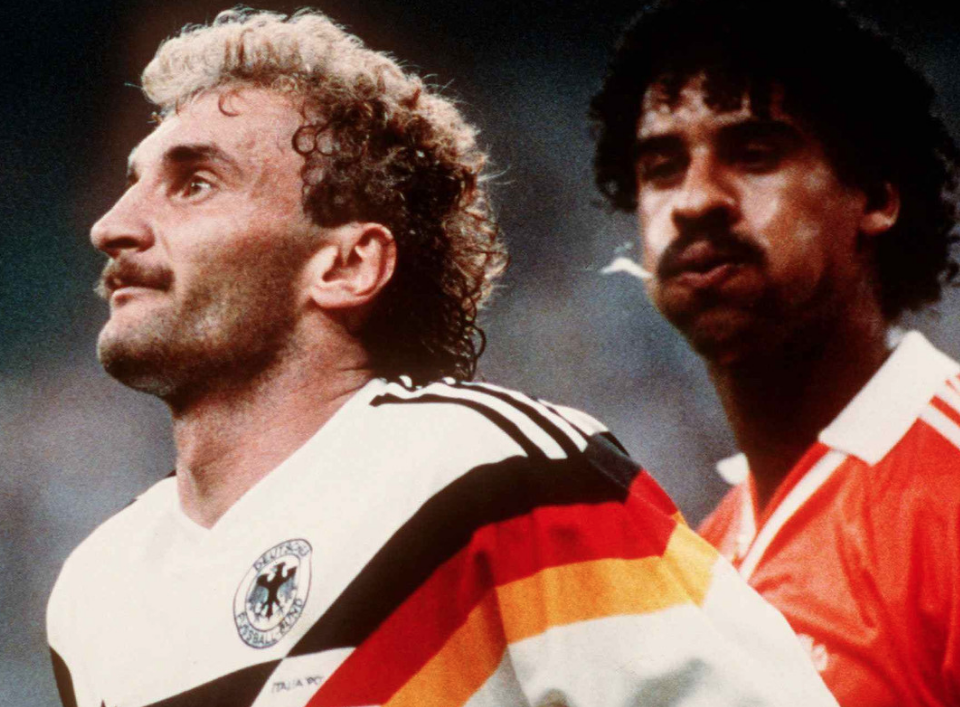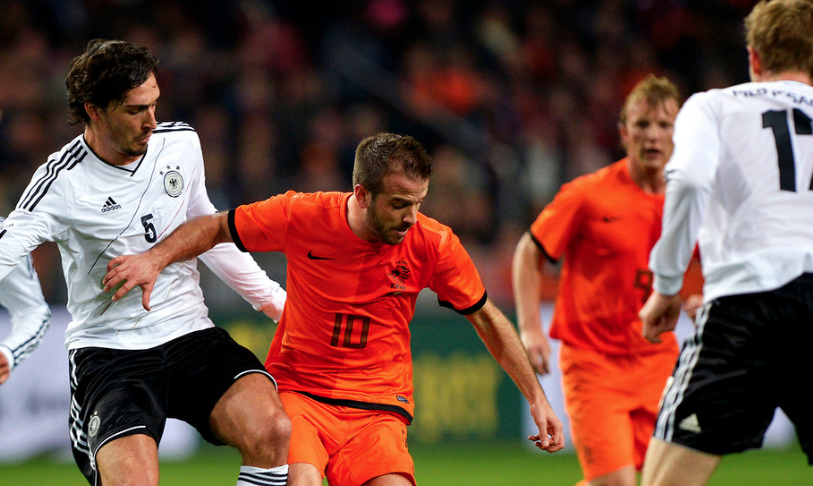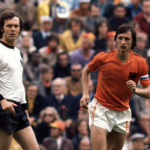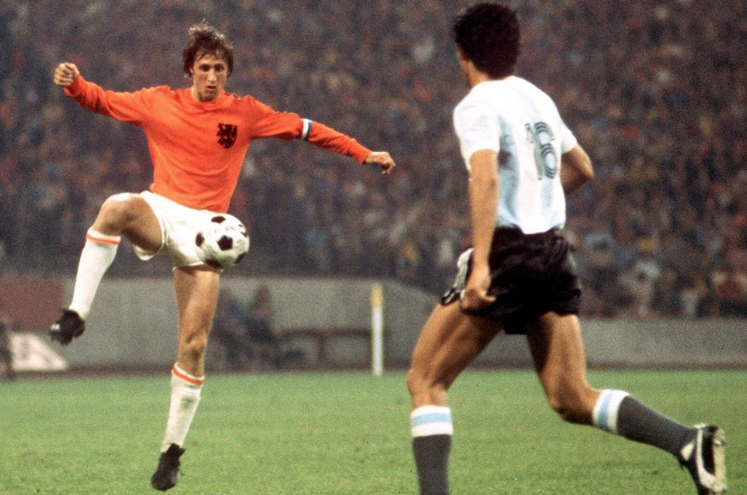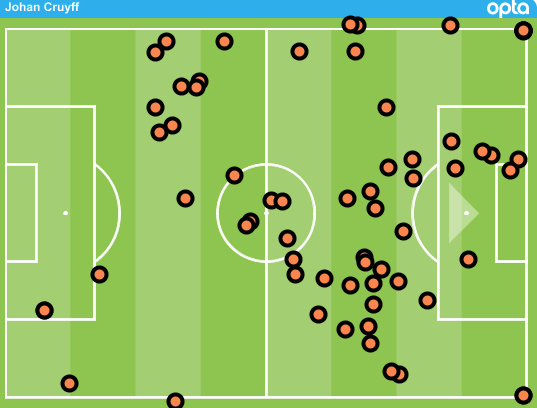Any match vs Germany (or West Germany) will bring the heart rate of any Oranje fan up. The pantomime villains! But if we get a double bill for games, vs Germany (our neighbours on the East) AND the Belgians (our neighbours to the South), well… any Oranje fan would start salivating.
We do have a firm rivalry with both nations and now we’ll meet them both in the course of 4 days. There is a God! The rivalry with Belgium is more brotherly. We actually like the Belgium people. We love their country, their food, their beaches and we also are impressed with their national team, at the moment. We had massive competitive games against them, but also some amazing friendlies, with heaps of goals and lots of good memories.
Less so with the Germans. Yes, those clashes in the 40-45 World Cup…eh.. War didn’t help. The first post-war match at top level was the finals in 1974 of course.
How many articles / posts have I not written about this in the past 14 years! On the Worldcupsoccerblog and on this blog… All these wonderful stories, anecdotes… But whatever we say about it, we lost. That doesn’t change. I remember vividly watching the game. I was 12 years old (yes!) and watching the games at my holiday address, with heaps of other people. A colour tv, but a small screen. I sat on the floor, right with my nose on the screen.
In those days, the expectations around the national team were low. Really low, as somehow it never really register with the pros. They were paid for by the clubs, they weren’t properly insured when playing for the NT and somehow, we weren’t too interested. When Holland went to West Germany for the World Cup, no one expected them to shine. And with reason, as we actually scored our winning qualification goal in off side position and actually didn’t deserve to go. And ironically, Belgium didn’t qualify as a result of that goal. A good reason for them to dislike us!
So there I was. Johan Cruyff was an untouchable. He was an Ajax player, so as a Feyenoord fan I wasn’t openly a JC fan, but like anyone, in my heart I adored him as a player. Willem van Hanegem was my fave. Partly because he played for Feyenoord and partly because he lived just one block away from me. As did midfielder Wim Jansen. We had some rock stars in the team too, the 5th and 6th Beatle: Ruud Krol and Johnny Rep. And there were some unknown players part of the team too. Players a 12 year old didn’t see play often: Robbie Rensenbrink, who was at Anderlecht. The snake man. What a player! I didn’t get why Keizer didn’t play on the left wing, but after seeing one match (vd Uruguay) it was clear why Rensenbrink was the man. Jan Jongbloed, our sweeper keeper was another unknown, a massive masterstroke by Michels Cruyff to put him in.
But the Germans got the better of us. Was it our arrogance? Was it the night of lost sleep, as JC had to spend hours on the phone with his wife pre-match, to explain the naked girls in the swimming pool? Was it the sheer quality of Sepp Maier, who simply stopped every ball aimed at the German goal?
Who knows. Willem van Hanegem says it was arrogance. Johan Cruyff said he was played out of the game by Berti Vogts. Others will point to the ref and the first real schwalbe/dive by Holzenbein, getting the Germans their penalty.
But the world took notice. And Oranje made its mark. Winning or losing, it didn’t matter.
We need a revenge though. In 1976, we bitterly disappointed, with red cards for our star players. In 1978, we took on the West Germans again and drew 2-2. We ended up in the finals again, and West Germany didn’t. Still, it didn’t feel like revenge.
In 1980, the Germans were boss. Holland disappointed massively and in 1982, 1984 and 1986, we didn’t compete. Long long stories. And all these stories have been told, here and at other blogs in the past. Simply ask me if you want me to rehash them.
Then came 1988. The 12 year old fan was now a 26 year old supporter, with some ties to Feyenoord and the national newspaper Algemeen Dagblad. And as a result, found himself in Hamburg on the stands. My partner worked for the newspaper and called me up at 11 am-ish. “I have tickets for the game, you gotta come now!” I drove from Amsterdam (my place of work) to Rotterdam (where the newspaper resides) to pick her up and our tickets. Changed clothes at home and off we went to Hamburg. We arrived 30 mins before the game and saw Oranje win vs West Germany (1-2) in an unforgettable match. The one where West Germany and Holland both got a gift penalty. The one where Van Basten scored the winner in the last minute. The one where Ronald Koeman wiped his ass with Olaf Thon’s shirt and Van Breukelen yelled at “I hope you focking sterbst” to Frank Mill…
And while we walked out of the stadium, in a state of joy, my partner saw a sports editor of her newspaper, and we tagged along to the players’ hotel to celebrate the win till the early morning. I vividly remember a somewhat boozy conversation with a young bloke at the party whom I later recognised as a very young Richard Witschge. Around 2 am I realised we still had 5,5 hours to drive home as work was waiting the next morning and we decided to leave.
The story of our trip to Munich the Sunday next, where Holland took on the USSR in the finals is even more epic, but will have to wait for another time. Now its about The Germans!
In 1990, the same squad albeit with Richard Witschge among others, was keen to win the World Cup, in Italy. We played Germany again and that is where the comparison with 1988 stops. It was shocking. Holland actually didn’t play that bad vs Germany, but our key players simply didn’t come to the party. Ruud Gullit and Marco van Basten in particular were sub-standard. Our best players were John van ‘t Schip and Jan Wouters, with Rijkaard getting the spotlights spitting a big one in Voller’s wig. We lost. And had to go home. The players lamented after the World Cup that the power struggle between Cruyff and Michels had demoralised the team and Beenhakker’s army boot camp in Yugoslavia prior to the tournament didn’t help either. If you wanted a performance from the likes of Gullit and Rijkaard, it was key to have a player’s hotel close to the action (clubs, girls, pizza) and not in a remote and desolate castle with nothing to do but to moan and whinge and whine.
I watched this game at home again, in despair. The group stage of Oranje was already abyssmal so expectations were not too high. Most supporters were distraught that the KNVB ignored the wishes of the players and signed Leo Beenhakker for the coaching job.
In 1992, at the Euros. Oranje got the chance to take revenge on the Germans and we did. In a master class, in which Van Basten conducted Bergkamp’s goals (pointing at Winter where to place the ball) and an uncharacteristic distance striker from Rob Witschge, Holland won 3-1 in probably the best performance a Dutch national team demonstrated vs the Teutons. I remember watching this game with my best friend Nico and my life partner of course in my home, where we ended up dancing through the apartment block, convinced we’d win the title, against the beach team of the Danes.
In 1994, the Allied forces the US organisers of the World Cup keep Holland and Germany separated.
In 1996, we sadly don’t meet them either. We end up being dressed down by England and Germany ends up winning the Euros with the worst team ever.
At so the list goes on. We have been able to keep them at bay in 1998, 200o, 2002 (by not qualifying) and meet them again in Portugal 2004. First group game, and Germany tastes first blood. Van Nistelrooy scores the equaliser late in the game and everyone is happy with the draw. In 2006 we miss out on playing them, same in 2008 and 2010. It’s 2012 when we do end up playing them again in the group stage and after a good start (15 minutes or so) we forget to defend and allow them to score first. A situation we simply can’t overcome and despite having the silver medal at home of that previous World Cup, we end up going home. In 2014, again, the Germans are able to get to the finals without having to play us and that must have helped them a lot.
By now, all stories about how Germany took a couple of pages from the Dutch football Academy book in 2000 are fairly well known. They re-invigorated their youth development and started to play more Dutch than German. Their horrific tournament in Russia this year is a clear testament how the Germans have really started to copy all we do….
What will happen tomorrow?
Well, I think we’ll win 2-1. I think Germany will be a tad nervous, a bit forced maybe, and on their toes for the young Dutch talents.
I think Koeman will play the following 11:
Cillesen
De Ligt – De Vrij – Van Dijk – Van Aanholt
Wijnaldum – Frenkie De Jong – Daley Blind – Strootman
Bergwijn – Memphis
I think Memphis and Wijnaldum will score.

